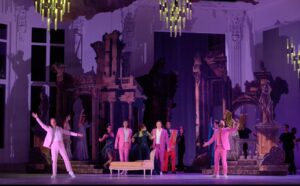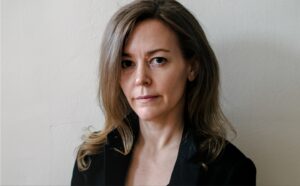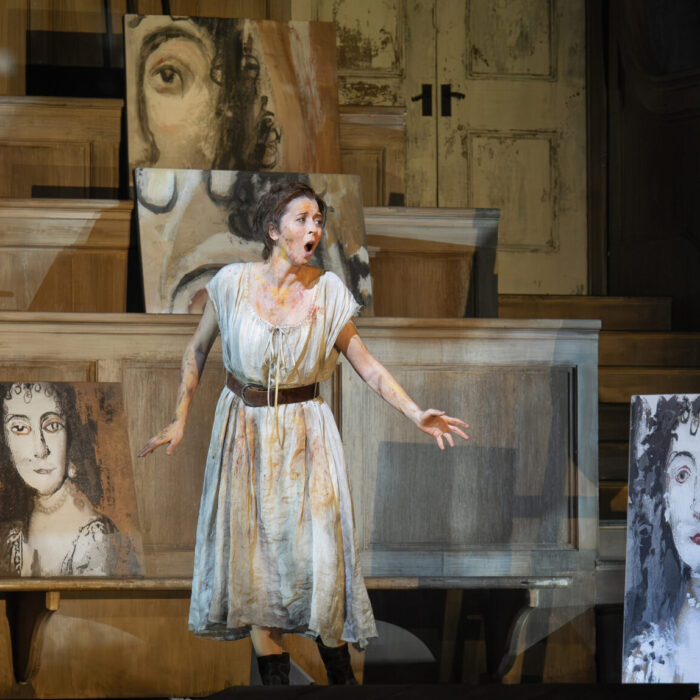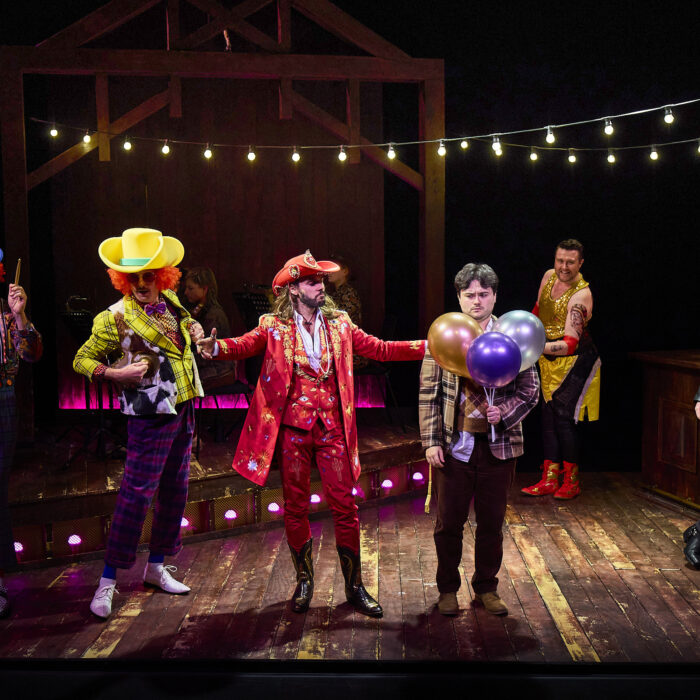
Teatro La Fenice 2023-24 Review: Ariadne auf Naxos
Director Paul Curran & Conductor Markus Stenz Delight in the Pleasures of a Fantastic Cast
By Jennifer Pyron(Photo: ©Michele Crosera)
Teatro La Fenice was transformed into a palace of playfulness and passion for Strauss’s “Ariadne auf Naxos.” The last time I saw this opera was in 2011 at the Met and in that space, I felt, there was just too much space. Therefore, to experience “Ariadne auf Naxos” in a more intimate space such as La Fenice gave me the opportunity to open up to what Strauss’s musical intentions and Hugo von Hofmannsthal’s libretto really ask for from the cast – a quality of purposeful delight in the music, mythology, and comedy that only this opera within an opera can personify.
Even if one has never been to an opera, both “Ariadne auf Naxos” and La Fenice support the fundamental nature of crowd-inducing pleasure. From the soft pink chairs, divinely inspired murals, glittering and gilded light fixtures, romantic box seats, and a location that just so happens to be in Venice, Italy, this theater is unlike any other. It is a lover’s paradise!
“Ariadne” definitely deemed desirable the intimate quality of what La Fenice is made for and the idea of cast members staying on stage for most of the opera, creating a collective atmosphere of fun and excitement for both the Prologue and the Opera together stemmed from their ability to do so. La Fenice is this kind of space. As a result, it repeatedly captivated the audience’s attention because of its world-renowned beauty and accessibility. Here is an opera house that caters directly to its audience, giving them exactly what they’re looking for – enlightening and exalting entertainment!
Performance Highlights
The La Fenice Orchestra displayed Strauss’s intentions for this opera very well and the audience responded accordingly through their engagement with the developing synopsis and characters. Conductor Markus Stenz was visibly having a blast the entire night while joyfully expressing Strauss’s light-hearted and playful music. Also, every time soprano Erin Morley as Zerbinetta was on stage the audience was all eyes and ears for what she had planned to do next.
All in all, “Ariadne auf Naxos” was fascinating to watch. The sets and costumes by Gary McCann were exquisite. Zerbinetta wore a light pink flirty dress with an oversized red sequined heart on the bodice, signifying her undying pledge to love’s infidelity and levity. The set also mirrored this eccentricity with soft pink lighting and matching pink suits for her colleagues who fawned over her repeatedly in unison.
Morley’s soprano was beautifully clear and coherent. Her coloratura cascaded up and down with ease, making opera sound delicate and riveting at the same time. I saw several audience member’s faces light up with bright smiles during her performance and delightful antics as Zerbinetta is plentiful. For me, this role can be a hit or miss based on how the soprano approaches this level of “fun” in an opera. Luckily, Morley displayed a grounded approach alongside an alleviated duty to make Zerbinetta as happy-go-lucky as she can be. There was no overacting going on, just bountiful baroque banter.
Soprano Sophie Harmsen as Der Komponist played up her role as the extroverted organizer. Her voice was interesting in that her connectivity to breath support seemed to differ at moments, but this did not take away from her vocal quality, it just highlighted the timbre of her natural voice. La Fenice also supported her in that I could hear her easily while sitting in the orchestra area. This is another great point made about this space, it is acoustically attuned to accenting the voices on stage.
During this opera, I also remembered watching “Renée Fleming’s Cities That Sing – Venice” in IMAX and reflecting on the specific acoustics of the theater. This high quality of care and attention to detail proved to serve very well! Richter’s voice was given a body to freely expand in the hall and it was amazing to experience this live and in action.
Soprano Sara Jakubiak as Ariadne also leaned into her role in this way, making Ariadne a pillar of stability and savory singing throughout the production. Jakubiak’s soprano was rich with vocal agility and technique. It was an absolute treat to listen to her.
Italian soprano Giulia Bolcato’s voice as Echo also stood out in this production as confident and convincing. Her rounded timbre sounded vocally aligned and connected to her breath support, giving her the ability to float in her upper register with ease and expressivity.
Tenor John Matthew Myers as Bacchus exuded a gentle demeanor that made for an interesting development of chemistry on stage. His voice sounded pure and powerfully romantic. Even his physical gestures exuded gracefulness. I enjoyed the breath of fresh air he brought to the cast’s dynamics and am curious to see him blossom in more roles.
Illuminating Cast
Karl-Heinz Macek as Der Haushofmeister and Baritone Markus Werba as Ein Musiklehrer sang with attention to detail and delight. Their voices sounded full of life in La Fenice’s acoustics. Tenor Nicola Pamio as Ein Offizier, tenor Blagoj Nacoski as Ein Tanzmeister, bass Francesco Milanese as Ein Perückenmacher, and bass-baritone Matteo Ferrara as Ein Lakai were a joy to experience in this opera. Their voices and choreography added depth and comedy all throughout.
Baritone Äneas Humm as Harlekin, tenor Mathias Frey as Scaramuccio, bass-baritone Szymon Chojnacki as Truffaldino, tenor Enrico Casari as Brighella, soprano Jasmin Delfs as Najade and mezzo-soprano Marie Seidler as Dryade were also of notable high quality voice in their roles. Honestly, this cast was like a family of fabulous friends. Everyone worked together to make the opera feel inclusive and, as I noted earlier, accessible to the audience.
Playing Up Life’s Imperfections
Teatro La Fenice’s “Ariadne” gave both the cast and audience members an evening to remember and cherish for what it was – a wonderful way to connect with each other. The level of attention made possible by the music and libretto’s quick pace only added to the broad spectrum of potential interest from anyone, from anywhere. This is how opera can illuminate life’s imperfections. The simplicity that comes with a cast and creative team that enjoys what they do and does it very well.
Director Paul Curran said it best in the program notes when he articulated the fact that “Strauss examines the human state, analyzes how humans react with each other, the difficulty of compromise, as in the case of the music teacher when he tells his student ‘Look, if you want to do it you have to compromise because the world is not perfect.’” To observe life through the rose-colored lights of La Fenice was a dream come true in the best possible sense of this illusive illustration of one’s own imagination.



